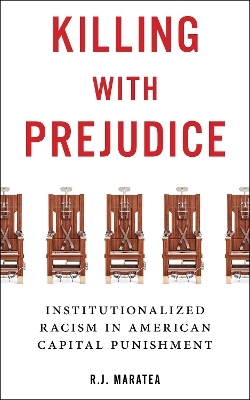
Killing with Prejudice
Institutionalized Racism in American Capital Punishment
Seiten
2019
New York University Press (Verlag)
978-1-4798-8860-3 (ISBN)
New York University Press (Verlag)
978-1-4798-8860-3 (ISBN)
A history of the McCleskey v. Kemp Supreme Court ruling that effectively condoned racism in capital cases
In 1978 Warren McCleskey, a black man, killed a white police officer in Georgia. He was convicted by a jury of 11 whites and 1 African American, and was sentenced to death. Although McCleskey’s lawyers were able to prove that Georgia courts applied the death penalty to blacks who killed whites four times as often as when the victim was black, the Supreme Court upheld the death sentence in McCleskey v.Kemp, thus institutionalizing the idea that racial bias was acceptable in the capital punishment system. After a thirteen-year legal journey, McCleskey was executed in 1991. In Killing with Prejudice, R.J. Maratea chronicles the entire litigation process which culminated in what has been called “the Dred Scott decision of our time.” Ultimately, the Supreme Court chose to overlook compelling empirical evidence that revealed the discriminatory manner in which the assailants of African Americans are systematically undercharged and the aggressors of white victims are far more likely to receive a death sentence. He draws a clear line from the lynchings of the Jim Crow era to the contemporary acceptance of the death penalty and the problem of mass incarceration today.
The McCleskey decision underscores the racial, socioeconomic, and gender disparities in modern American capital punishment, and the case is fundamental to understanding how the death penalty functions for the defendant, victims, and within the American justice system as a whole.
In 1978 Warren McCleskey, a black man, killed a white police officer in Georgia. He was convicted by a jury of 11 whites and 1 African American, and was sentenced to death. Although McCleskey’s lawyers were able to prove that Georgia courts applied the death penalty to blacks who killed whites four times as often as when the victim was black, the Supreme Court upheld the death sentence in McCleskey v.Kemp, thus institutionalizing the idea that racial bias was acceptable in the capital punishment system. After a thirteen-year legal journey, McCleskey was executed in 1991. In Killing with Prejudice, R.J. Maratea chronicles the entire litigation process which culminated in what has been called “the Dred Scott decision of our time.” Ultimately, the Supreme Court chose to overlook compelling empirical evidence that revealed the discriminatory manner in which the assailants of African Americans are systematically undercharged and the aggressors of white victims are far more likely to receive a death sentence. He draws a clear line from the lynchings of the Jim Crow era to the contemporary acceptance of the death penalty and the problem of mass incarceration today.
The McCleskey decision underscores the racial, socioeconomic, and gender disparities in modern American capital punishment, and the case is fundamental to understanding how the death penalty functions for the defendant, victims, and within the American justice system as a whole.
R.J. Maratea is Visiting Assistant Professor of Sociology at George Washington University. His research focuses on capital punishment and the sociological implications of mass communication. He has authored and co-edited several books, including The Politics of the Internet (Lexington 2014), Race and the Death Penalty (with David Keys, Lynne Rienner 2016), and Social Problems in Popular Culture (with Brian Monahan, Policy Press 2016).
| Erscheinungsdatum | 20.03.2019 |
|---|---|
| Zusatzinfo | 7 Illustrations, black and white |
| Verlagsort | New York |
| Sprache | englisch |
| Maße | 127 x 203 mm |
| Themenwelt | Recht / Steuern ► EU / Internationales Recht |
| Recht / Steuern ► Strafrecht ► Kriminologie | |
| Sozialwissenschaften ► Ethnologie | |
| Sozialwissenschaften ► Soziologie | |
| ISBN-10 | 1-4798-8860-5 / 1479888605 |
| ISBN-13 | 978-1-4798-8860-3 / 9781479888603 |
| Zustand | Neuware |
| Haben Sie eine Frage zum Produkt? |
Mehr entdecken
aus dem Bereich
aus dem Bereich


